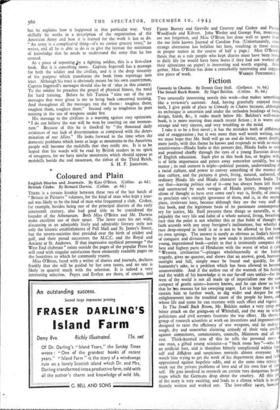Fiction
Comedy in Chains. By Dennis Gray Stoll. (Gollancz. 75. 6d.) The Small Back Room. By Nigel Balchin. (Collins. 8s. 6d.) Two unusually interesting novels this week—that makes something like a reviewer's summer. And, having gratefully enjoyed them both, I give pride of place to Comedy in Chains because, although its technique is uncertain and under the Orthodox headings of form design, finish, &c., it ranks much below Mr. Balchin's well-made book, it is more moving than much recent fiction ; it is warm and strange and very sincere, and very troubling to the mind.
I take it to be a first novel ; it has the mistakes both of diffidence and of exaggeration but it was more than well worth writing, and we must hope that exaggeration; Stoll will go on and do better, more deeply, more justly, with this theme he knows and responds to with so much sensitiveness--Hindu India at this present day, Hindu India as seen and pondered chiefly through the eyes of a young- Eurasian doctor of English education. Such plot as this book has, or begins with, is of little importance and peters away somewhat untidily, but no matter' its real content is triple—political passion, understanding of a racial culture and power to convey something of the essence of that culture and the pictures it gives, living, natural, unforced, of ordinary Hindu life and Hindu character in Southern India. To say that—leaving politics out of it—one has always been left blank and unattracted by such vestiges of Hindu poetry, imagery a idiom of thought as have ever come one's way is, firstly, of course to proclaim one's outright ignorance of them, and is, in the seco place irrelevant here, because although they are the very stuff this book, and the legitimate basis of its passionate contempora cry for justice, Mr. Stoll presents these things so naturally, as palpably the very life and habit of a whole natural, living, breathin race that the point is not whether this or that habit of thought faith accords with any stray foreigner's inclinations but whether race deep-steeped in itself is or is not to be allowed to live fro its own springs. The answer is surely as obvious as India's histo of conquest and division has by now made it inextricable, and thi young, impassioned book—unfair in that it insistently compares oh best and highest parts of Hinduism with the worst of what it call "Western civilisation "—plunges wholeheartedly at the India tragedy, gives no quarter, and shows that an answer, good, human outright and full, simply must be found and quickly, for a humanity's sake, to a problem which has been allowed to becom unanswerable. And if the author out of the warmth of his feelin and the width of his knowledge is to our far-off ears unfair—for th west of the world is not all made up of imperialism nor the eas compact of gentle saints—heaven knows, and he can show us her that he lras reasons for his sweeping anger. Let us hope that it w sustain him to further work, to dig wider and deeper for enlightenment into the troubled cause of the people he loves, a whose life and scene he can recreate with such effect and vigour.
In The Small Back Room, Mr. Bakhin makes a very crisp an bitter attack on the goings-on of Whitehall, and the way in whic politicians and civil servants frustrate the war effort. He shows group of research scientists at work on inventions and improvemen designed to raise the efficiency of war weapons' and he makes tough, dry and somewhat alarming comedy of their vain confli against committees commissions, councils, Ministers and all th rest. Thick-knotted into all this he tells the personal story one man, a gifted young scientist—a "back room boy "—who ha an artificial foot, and is therefore bitterly complicated within him self and diffident and suspicious towards almost everyone. W watch him trying to get the work of his department done and bill appreciated against hopeless odds and at the same time trying t work out the private problems of love and of his own fear of him self. He gets involved in research on certain very dangerous boob traps which the Germans drop about the country. All this pa of the story is very exciting, and leads to a climax which is ma ficently written and worked out. The love-affair asart, howev
which ought to be good—the girl is a pet and most sympathetically drawn—is marred, I think, by a kind of coyness and offhandedness which is supposed to be very, very bitter and sophisticated, but which at least one reader found embarrassing and not at all like truth. But, taken as a whole, the hook is witty, trim, hard and beautifully made—an accomplished and exciting entertainment.
KATE O'BRIEN.



























 Previous page
Previous page